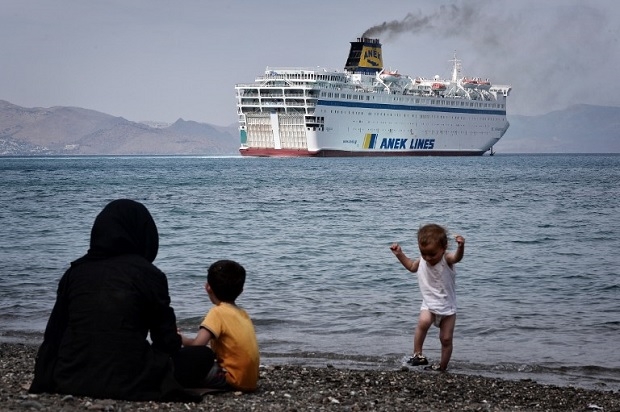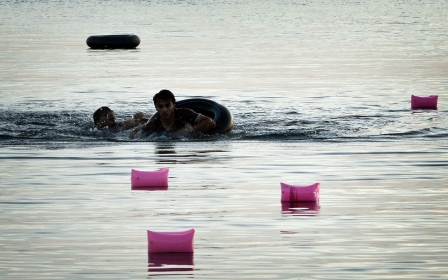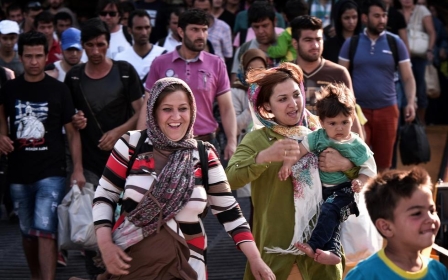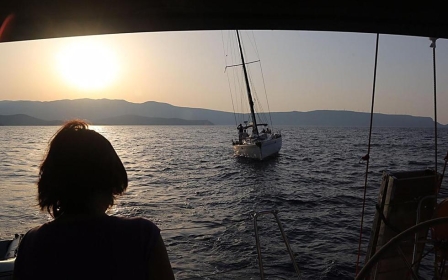Thousands of Syrians ferried to Greek mainland as islands despair

ATHENS - A Greek government-chartered ferry was transporting some 2,600 Syrian refugees to the Greek mainland on Wednesday, as islands struggling with an influx of migrants warned that the crisis is endangering public health.
The Eleftherios Venizelos left the island of Kos with some 1,700 Syrian refugees on board, and picked up another 900 on the islands of Kalymnos, Leros and Lesbos.
It had initially been scheduled to sail to the northern port city of Thessaloniki on Thursday morning.
But it was diverted to Piraeus, the port of Greek capital of Athens, where it was expected at 5:45 GMT Thursday, the Greek news agency ANA said.
It said the decision was made following a meeting with various authorities, including those in Thessaloniki who felt the city could not cope with that many refugees at one time.
Buses had already been rented in Thessaloniki to take the refugees to the border with Macedonia.
"The situation is out of control," Leros Mayor Michalis Kolias said in a letter to the government, asking for help in getting hundreds of migrants off the island.
"The lives of irregular migrants and of the island's residents and visitors are in danger," Kolias said, pointing to health risks from overcrowding.
Macedonia also warned Wednesday it was running out of trains to transport the thousands of Syrian refugees heading toward the EU, and said it has urged its neighbours to help combat the "alarming situation".
Many refugees attempting to reach wealthier European nations have sneaked across Macedonia by foot, making it an increasingly popular route for countless refugees.
"It's certain that if there is no intervention from the United Nations, the European Union ... Greece will have a slow-burning bomb at its foundations, and everyone should understand that," said civil protection minister Yiannis Panousis, according to Reuters News Agency.
"The Macedonian Railway Company has no more capacity to carry all those who want to travel toward western European countries," the head of the state railway Nikola Kostov told Telma television channel.
A record 107,500 migrants arrived at the European Union's borders last month, according to new figures released by border agency Frontex, a dramatic increase that is creating a humanitarian crisis for the 28-nation bloc.
"This isn't just a problem for Greece or the countries of the south. It's a problem for Europe and the world, which will soon be forced to deal with this problem," said State Minister Alekos Flabouraris.
Greece has seen around 160,000 migrants - virtually all of them fleeing war and persecution in Syria, Afghanistan and Iraq - land on its shores since January, according to the UN refugee agency.
The Greek Aegean Islands close to Turkey have borne the brunt of the influx, with authorities overwhelmed and rights groups criticising miserable conditions facing the migrants, who are often forced to sleep in the open for weeks and queue for days to secure departure papers.
The government has announced plans to charter a second ship to move as many migrants as possible to the mainland, but with the tourism season in full-swing there are no large vessels to spare, the association of ferry operators said Wednesday.
"There are no ferries available at present (and) next week there will be a problem as the ferries will be at near 100-percent capacity," association chairman Michalis Sakellis told Vima radio.
Greece is giving Syrian refugees priority in registration and embarkation for the mainland, over other nationalities such as Afghans and Pakistanis.
On Lesbos, scuffles have routinely broken out between non-Syrian migrants stuck on the island, and an aid group on Tuesday warned the situation was reaching a "breaking point".
"Unless further ships are made available the total number of refugees on Lesbos, which normally has a population of nearly 90,000 people, could rise to more than 20,000 before the ferry service is able to accommodate them," the International Rescue Committee (IRC) said.
The small islands of Symi and Agathonisi, where there are more migrants than locals, also called on the government for assistance on Wednesday.
"I hope no more migrants come because the available space at the coastguard and police buildings is already taken by others," Symi mayor Lefteris Papakalodoukas told state television.
Tensions increased on Thursday when Macedonia declared a state of emergency on the border with Greece and called in the army to help control the massive numbers of migrants crossing the frontier.
Police were locked in a standoff with about 1,500 migrants and refugees stranded in no-man's land trying to cross into Macedonia.
There has been a desperate rush to reach the northern border and to cross over into Serbia before EU member state Hungary closes off its border with a controversial "anti-migrant" fence.
Macedonia said Wednesday it had asked its neighbours and other countries in the region to send more train wagons to transport refugees, but that none had responded so far.
"All our resources have been exhausted and it will only get worse in the coming days," the head of the state railway Nikola Kostov said.
Middle East Eye propose une couverture et une analyse indépendantes et incomparables du Moyen-Orient, de l’Afrique du Nord et d’autres régions du monde. Pour en savoir plus sur la reprise de ce contenu et les frais qui s’appliquent, veuillez remplir ce formulaire [en anglais]. Pour en savoir plus sur MEE, cliquez ici [en anglais].




